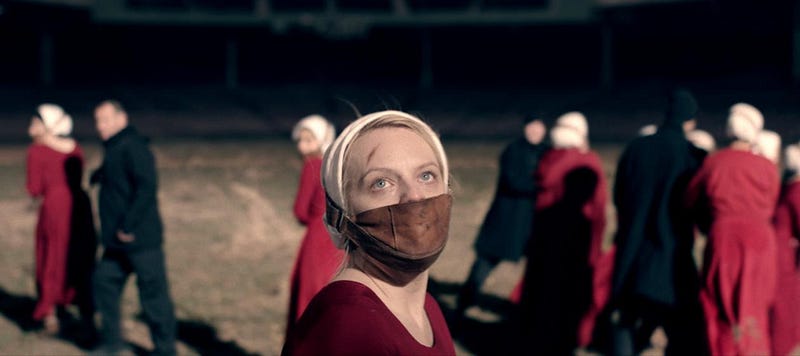The dystopic series goes “off-book” and embraces the misery of Gilead

The Handmaid’s Tale was timely. You’ll read that in every review or commentary on the series. I even said it myself in my review of Season 1. Regressive, unnerving events happening within our communities and governments across the world feel like steps towards a more dystopic future, one perhaps akin to that depicted by Margaret Atwood’s original novel. With the show now “off-book,” how would it rise to the challenge/freedom? Well, by embracing more of the former than the latter. This is a solidification of the downtrodden, the misery, and weight of oppression squeezing the last vestiges of freedom not just from those subjugated y it, but by those beholden to it too. The Handmaids Tale Season 2, now available on Blu-ray for you non-Hulu-ers, is hard viewing, but still undeniably engrossing.
Synopsis:
The Emmy® and Golden Globe® award-winning drama series returns with a second season shaped by Offred’s (Elisabeth Moss) pregnancy and her ongoing fight to free her future child from the dystopian horrors of Gilead. “Gilead is within you” is a favorite saying of Aunt Lydia. In Season Two, Offred and all our characters will fight against — or succumb to — this dark truth. Standout performances were given by returning cast members including Joseph Fiennes, Yvonne Strahovski, Alexis Bledel, Madeline Brewer, Ann Dowd, O-T Fagbenle, Max Minghella, Samira Wiley and Amanda Brugel. Moss, Wiley, Bledel and Dowd have all won Emmy® Awards for their performances in the series. Season Two of the series garnered three Emmy® Awards.


The first season, much like the book it was adapted from, ended on a cliffhanger. Was Offred (Elisabeth Moss, deserving of all the plaudits she gets) taking her first steps towards freedom, or was it all a trap, ready to usher her back into the clutches of Gilead? Season two, with no material to adapt, forged ahead with a story that delivers both: a temporary reprieve, before a pregnant Offred/June is hauled back to the Waterfords’ home to deliver her child to them. Remaining the focus, much of the season deals with the crushed psyche of Offred, having tasted freedom and now plunging into a deep depression. A fractious relationship with Serena Joy (a stellar Yvonne Strahovski), along with other developments, tests her mental and physical health. It’s darker, grimmer fare than season one, and while handsomely put together, does challenge the viewer to share the burden of those onscreen.
In many ways the season is about deterioration, a breakdown of individuals, relationships, and this new world order. Serena Joy is perhaps the best example, with flashbacks positioning her as one of the architects of this uprising, going from a place of influence to a woman using knitting needles to pass the time and wield what little power she has left. Regressive policies make women vessels for children, or adornments for the arms of men, and we see her complicity in pushing them upon society. For many of the architects of this society, we see it dawning on them what they have done. Are they still true believers, or just trying to convince themselves? In terms of Gilead itself, we also see new elements of their ceremonies and procedures, how people in power are beholden to the new rules that eased their ascent and may cause their decline. There is a sense of cannibalism at the top. The Commanders and councils who rule Gilead, vying for power, turn on each other or are undone by the very society they support and their abuse of influence within this fascist regime. What’s also deftly worked in to season two are more flashbacks. Not only do they show the lives of these people before the rise of Gilead, but how this dystopia came to be. We also see an expansion geographically, learning about the plight of discarded women in the colonies (heartbreaking work by Alexis Bledel and Madeline Brewer), and beyond the country’s borders, seeing how other nations have dealt with the crisis and view what has become of the USA. These aspects do much to convey how such a dark turn is not a long way down the line, but could disturbingly come within our own generation (or a few election cycles), growing out of fear and complacency.
The season ends with Offred, taken from her lowest to a place of strength, as she chooses her path. She’s been a character that offered the audience a look into this society, a surrogate caught up in events, rather than dictating them. History is often made by ordinary people though, circumstances driving them to stand, or sit (nod to Rosa) when they shouldn’t. This season showcases the resistance that is building against Gilead, and has certainly forged Offred into a place of activism. Whether the show picks this up and runs with it next season isn’t certain, but it seems the logical choice, and a way to give the show a path to something brighter, rather than wallowing in the misery for longer than we can bear.


The Package
The show veers through a variety of different settings, each with its own aesthetic. From the sumptuous home of the Commander, to the stark crispness of medical facilities, or the brown textured work-fields in the decimated regions of what used to be America. Each is represented well, with good detail, solid natural tones (although a greenish hue persists at times), and deep blacks. The release contains all 13 episodes spread over 4 discs, along with a limited set of special features:
- Season Two: Off Book: A featurette lasting nearly 12 minutes that touches on how the show has continued the story where the book left off. It’s interesting enough, with producers and showrunners discussing how to maintain consistency while opening up this world and fleshing out how it came to be. Themes, new locations, character arcs, and more.
- Dressing Dystopia: Recent demonstrations against regressive policies stemming the rights of women have taken the iconic outfit from the show and seared it into the public consciousness. This featurette builds on the first season, showing how subtle changes in the wardrobe for various characters reflects their changing situation and emotional states, the “cracks in the veneer,” as they put it.


The Bottom Line
Despite forging ahead with no literary guide, the showrunners have managed to stay true to Atwood’s novel, maintaining a focus on a handful of characters being crushed by Gilead, while expanding how this dystopia came to be, and how it functions. It’s a hard watch at times, so avoid the binge watching to fully appreciate the craft that goes into this series.

The Handmaid’s Tale Season 2 is available on DVD & Blu-ray from December 4th, 2018/


